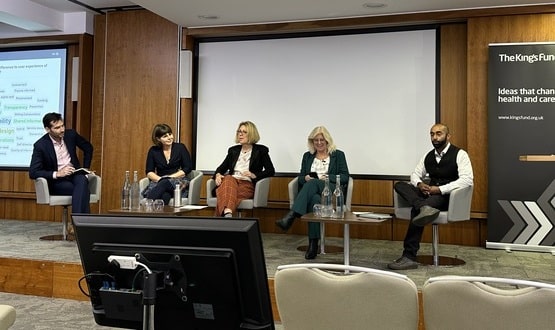Allison Gardner, senior scientific advisor at NICE, has told an audience at The King’s Fund that guidelines for AI need to be developed while there is still time to do so.
“We do not have a coherent framework of AI governance,” she said, speaking in a panel session at the Digital Health and Care Congress last Wednesday. “We need to get the governance up and running as the tech is running away from us fast.”
Also on the panel was Professor Alastair Denniston, consultant ophthalmologist at University Hospitals Birmingham NHS Foundation Trust and honorary professor at University of Birmingham, told the audience that “we’ve been lulled into a false sense of security” when it comes to AI.
Professor Denniston described AI as “really hard” and said that it “shows us how complex healthcare is”.
He also spoke highly of the potential of generative AI and how it can help improve and simplify language, making it easier for patients, before sharing: “I hope that we see health professionals have more time to be human.”
Denniston was joined by director of Google Health UK Susan Thomas who told attendees that “AI won’t replace doctors, but doctors with AI will replace doctors without AI.”
Thomas highlighted the importance of doctors using AI, adding that we need to be “bold, responsible and form partnerships” if AI is to be successfully implemented across the NHS. She also stressed that we must not become too reliant on AI, which could lead to the deskilling of doctors and the health workforce.
Elsewhere, day two of the event last Thursday saw chief information officer at NHS England John Quinn speak in the opening session alongside Helen Balsdon, interim chief nursing information officer at NHSE, Professor Sam Shah, chief medical strategy officer at Numan, and Tommy Henderson-Reay, social worker for the Digitising Social Care Programme at NHSE.
Quinn based his keynote speech around citizen-facing services, legacy, the digital workplace and the digital workforce. On the workforce, he said that “we know that to attract new talent is to make lives easier for everybody”, but currently we have not done enough for our digital workforce who “don’t have a clear enough career path”.
The NHSE CIO also spoke at HETT 2023 at the end of September, where he said that delivering national architecture and standards are one of the key priorities for NHS England going forward.
